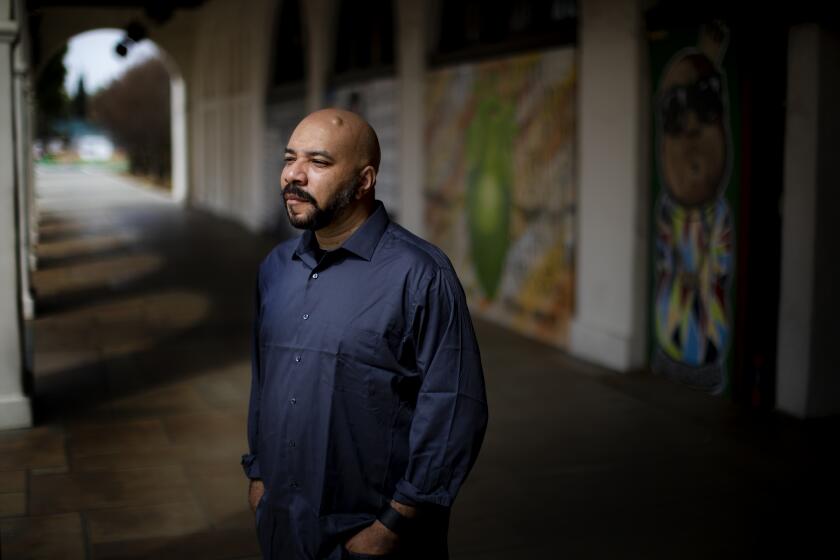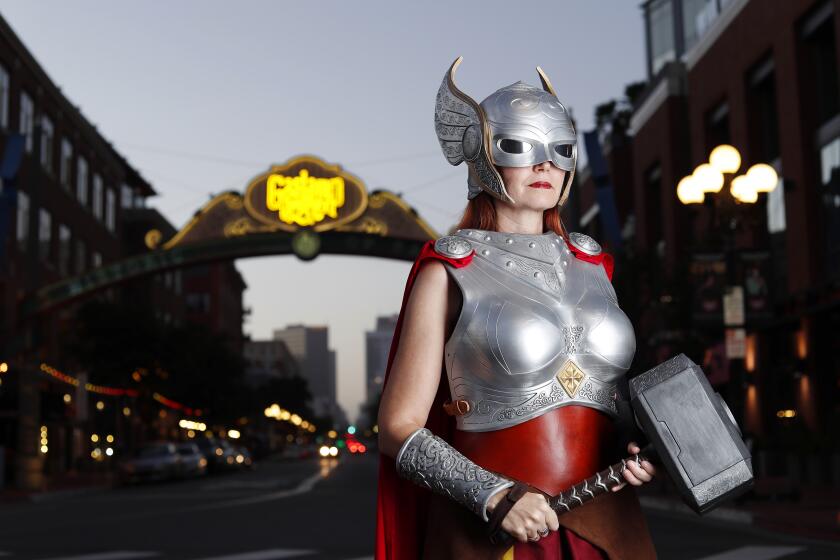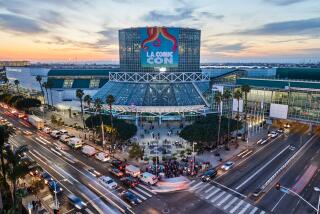Comic-Con returns this weekend to San Diego. But where are the comic book sellers?
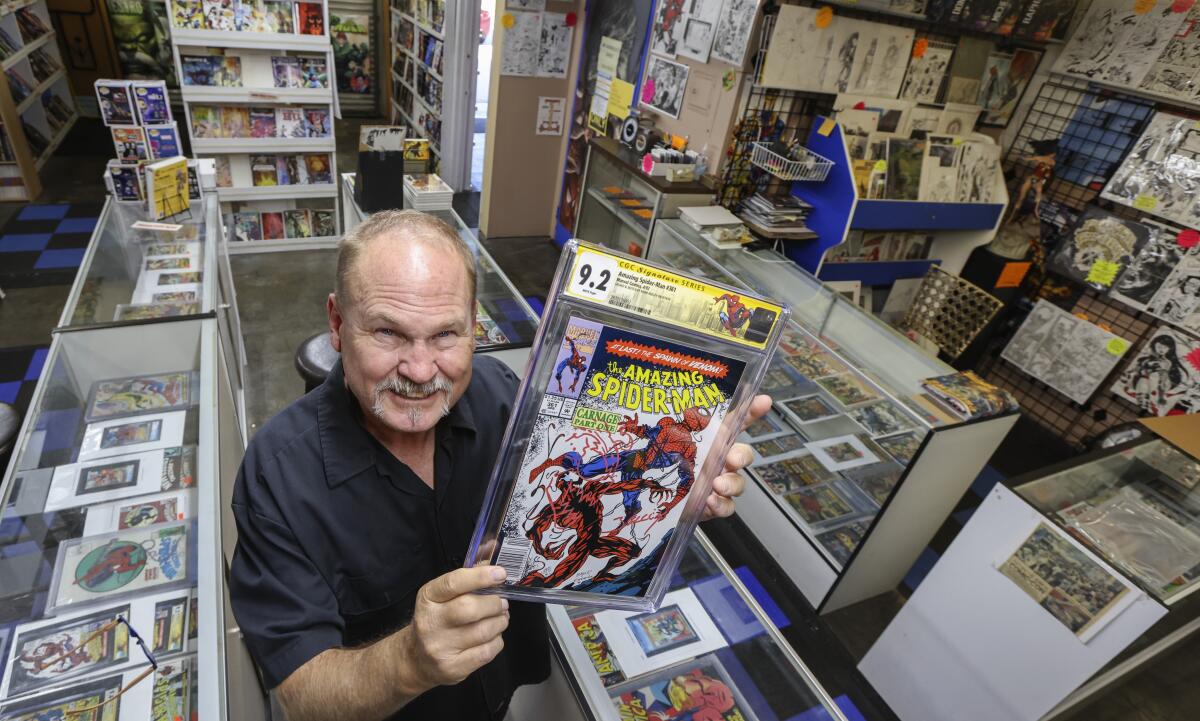
- Share via
Jamie Newbold is as seasoned a seller at San Diego’s Comic-Con International as they come.
The retired police officer began selling vintage back issues at the world’s biggest comic book convention in 1975, long before he opened his Southern California Comics store in 1998. He believes he’s one of the last original dealers at Comic-Con, which over the course of four days plus a preview night normally draws legions of people — many engaged in elaborate cosplay — looking to meet their favorite artists and authors, sit in on panels with famous TV and movie stars and wander through exhibition booths stocked with valuable editions of comic books and comic book art.
But last year, after Newbold had already acquired valuable inventory to sell at the convention, rising COVID-19 cases forced the cancellation of Comic-Con’s in-person gathering for 2020. His biggest sales week of the year was gone. “It was a kick in the teeth.”
Virtual events hosted by Comic-Con weren’t the same for Newbold. And when this summer’s in-person convention was also canceled, he thought 2021 would be another lost year. But this weekend, a smaller, three-day in-person event titled Comic-Con Special Edition is returning to the San Diego Convention Center. Even though the gathering will happen on a holiday weekend without the usual crush of summer crowds — attendance has been estimated to reach 167,000 in past years — comic store owners like Newbold are looking forward to the return of an IRL show. Even if many of them won’t be attending.
“The con, I need it,” Newbold says. “Most of us back-issue dealers need that show because it’s a real money maker. Comic-Con is a big part of my business.”
Yet Newbold says that he and most of the back issue dealers he knows across the country won’t be attending this time around.
“It’s not convenient,” he says. “It’s terribly expensive when you go for a week, but it’s practical because it takes a week to make the kind of money doing what we do in that show. There’s no way to justify dragging the material, say from New York, for a two-and-a-half-day convention where they charge so much for a booth.”
Even moving inventory just a few miles, Newbold says, is a logistical hassle for a scaled-down convention where the turnout is unknown.
But he’s not concerned about losing out on revenue. He feels he’s done well enough in the store this year to make up for the loss.
No matter the time of year, the energy of Comic-Con thrives in Southern California’s comic book stores — spaces deeply entwined within its culture.
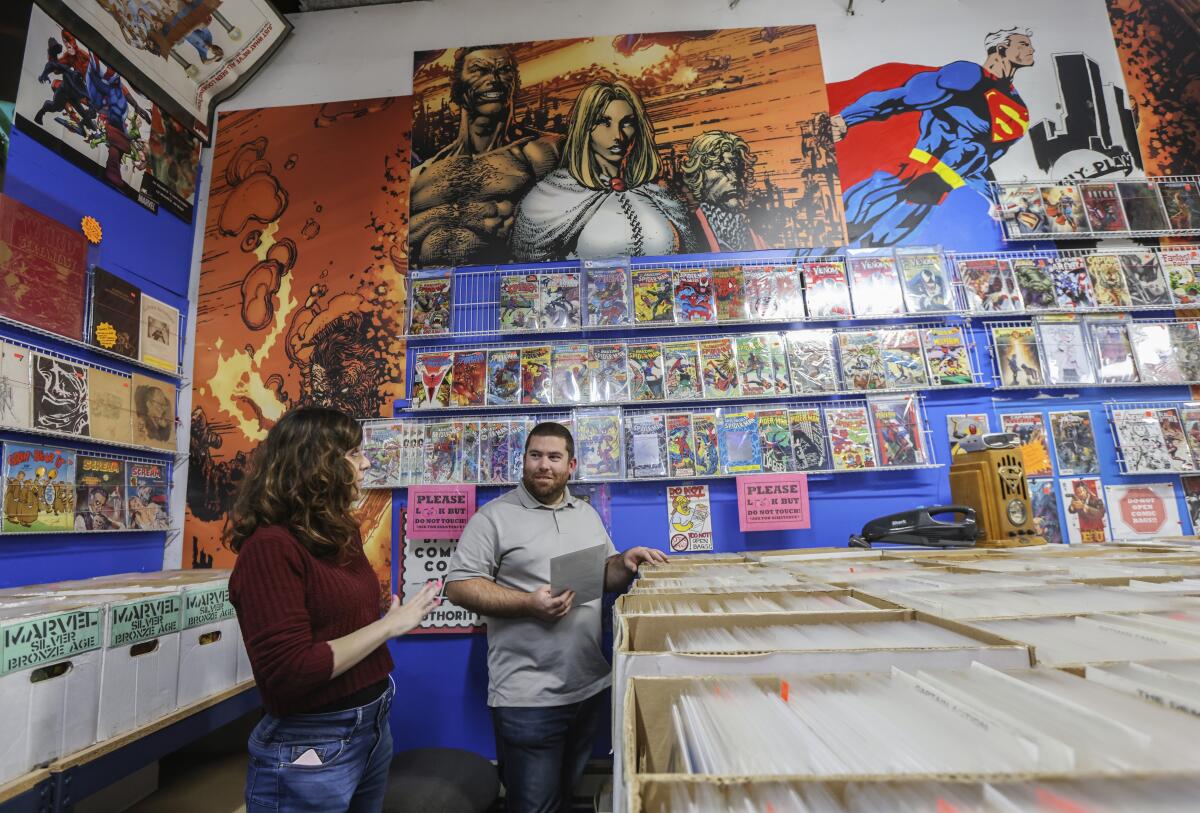
“Comic-Con began with a variety of exhibitors and chief among them were comic book retailers,” says David Glanzer, the organization’s chief communications and strategy officer. “That continues to this day. Of course the industry has changed a great deal in the past 50 years with digital comics, online retailing and other factors. But comics have, and continue to be, one of the main focuses of our event.”
About a mile northeast of the San Diego Convention Center, tucked on the corner of F Street and 11th Avenue, is one of the city’s newest comic shops: Now or Never Comics.
On a recent Friday morning in early November, the store is sleepy. Frankie Carreno stands behind the cash register greeting the few customers who walk in. Zach Norris organized comics in bins and shelves nearby. Playing on a TV screen in the back of the store is “The Lord of the Rings: The Fellowship of the Ring.”
Store owner Aaron Trites opened the two-story comic shop in December 2018. As he tells it, Comic-Con was among the biggest reasons he moved to the Southern California city from Boston and established a store downtown.
A new generation of Black artists is amending and countering comic books’ racist roots. They join a proud tradition of Black pioneers.
“I had high hopes for being in close proximity to the convention,” he says, “and I’m definitely anxious for the show to return so we can start getting some additional foot traffic from the con.”
Although he’s still getting a handle on how the convention affects business, he got a taste of it in 2019.
“In that time, our first year in Comic-Con was far and away the biggest sales week that we’ve had in the three years we’ve been open,” he says. Revenue exceeded three times the shop’s average monthly sales.
But when the pandemic hit in 2020, fear and uncertainty superseded. The comic industry shut down for almost three months, with no new comics — “the bread and butter of the comic book” world — in April, May or June. Trites, like Newbold and others, was forced to pivot to stay afloat: He expanded his vintage comics selection, ramped up sales on EBay, pushed social media promotions and offered curbside pickup.
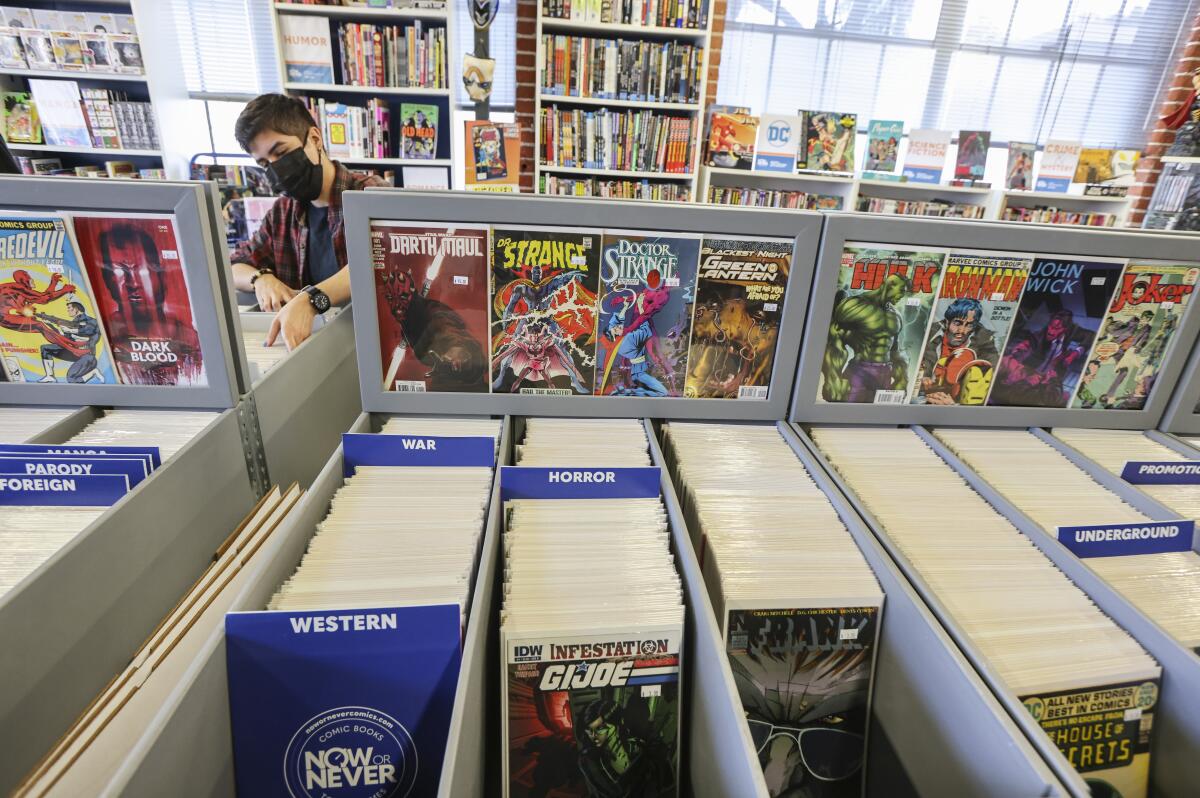
But much to his surprise, even as comic fans mourned Comic-Con’s cancellation for two consecutive years, its spirit was steadfast: The weeks the convention were supposed to happen were the store’s biggest sales weeks of the year.
“Even without the convention, everybody had a sense that the show would be happening that week, so everybody was still in the Comic-Con spirit,” Trites says. Customers showed up wearing shirts, hats and badges from previous events.
For the con community, the show would go on.
For the first time in 51 years, San Diego Comic-Con goes virtual, leaving a lonely landscape in the usually raucous streets of the city’s Gaslamp Quarter.
“It’s really nice to see how ingrained in the city the convention is,” he says. “It’s not just this traveling circus that rolls through town once a year and then disappears. It’s part of the city’s DNA.”
What this year’s Comic-Con will bring is anyone’s guess, but retail folks aren’t expecting pre-pandemic traffic given that people will head out of town to spend the Thanksgiving holiday with friends and family.
Last year’s traveling season was upended because of a burgeoning winter surge, but travel experts estimate some 3.8 million Southern Californians will be driving out of town this year.
For Trites, “any show is better than no show.”
Despite all that, Robert Estigoy will not be deterred.
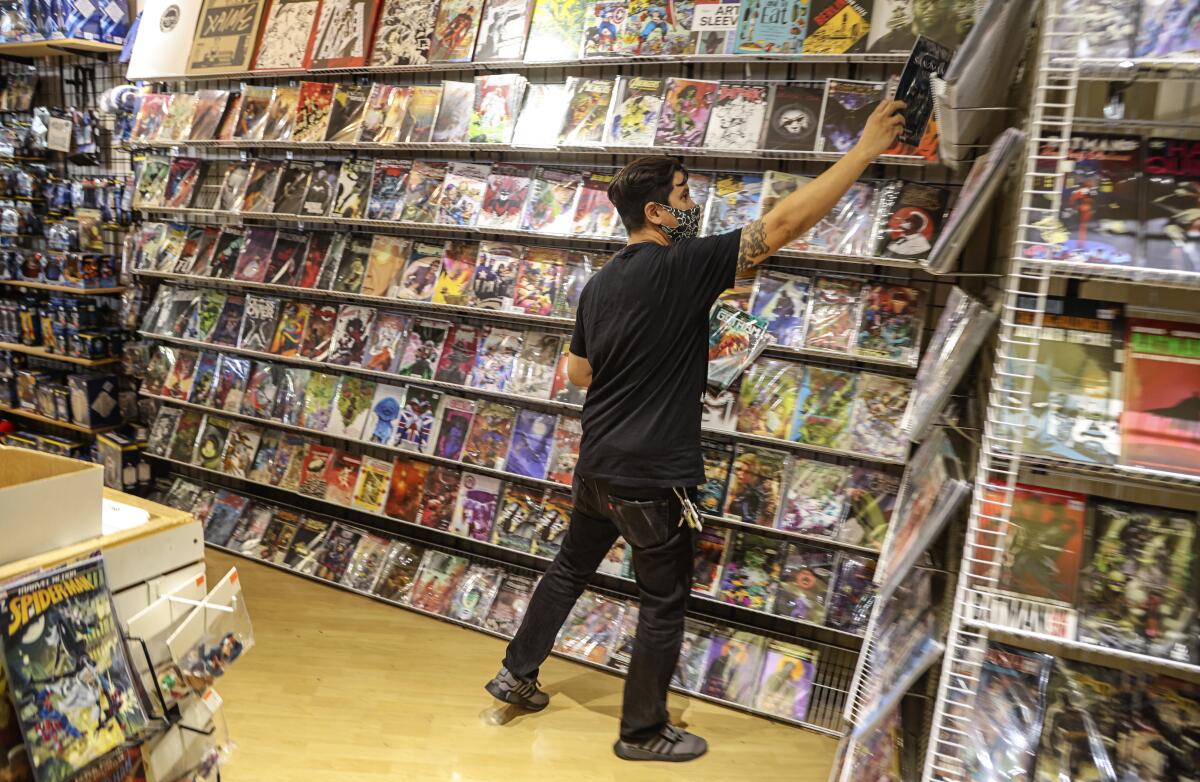
An assistant manager at Comics-N-Stuff in Chula Vista, Estigoy will be on the exhibit floor with his partner and illustrator Asia Estigoy selling their small-print-run comics, including their better known “Peaburt’s Big Adventure” and associated merchandise.
But the retail store he works for, which has exhibited at the convention for nearly 20 years, won’t be in attendance this time.
Estigoy is confident that people who don’t make the event will drop by the store instead, just as they’ve done for years. “Collectible and comic book stores are traditionally larger retail environments, so it gives people who don’t get tickets that Comic-Con experience during the convention and year round,” he says.
On a recent Friday afternoon, Shawnee Myers browses through the shelves and bins of Southern California Comics, an inconspicuous warehouse tucked inside an industrial San Diego cul-de-sac. Posters and murals of superheroes cover the walls and hang from the ceiling. Jazz music plays from a speaker nearby.
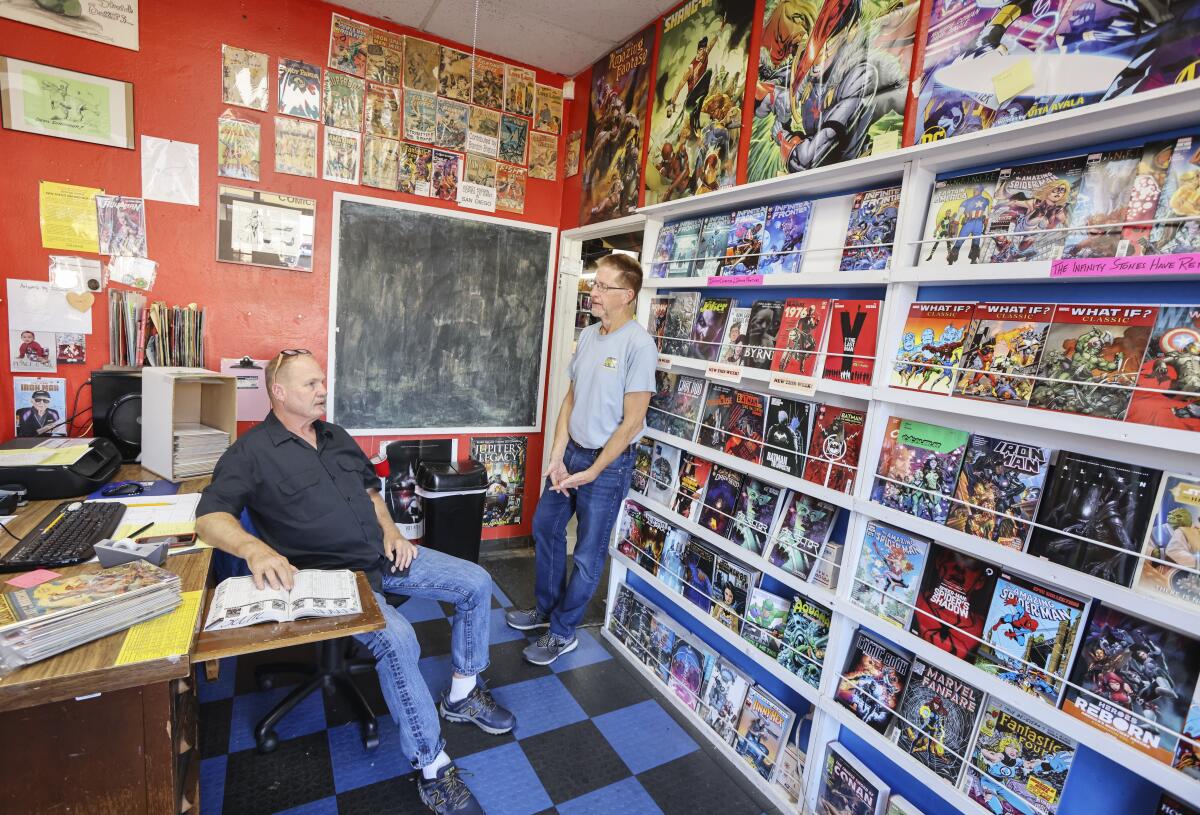
The haul for the San Diego resident and weekly customer includes comic book issues of “Batman,” the sci-fi fantasy series “By the Horns” and the apocalyptic “Penny for Your Soul: Death.”
Myers is attending this year’s Comic-Con Special Edition event with her husband and is disappointed to hear that her favorite local comic store won’t be vending. “It’s sad that he won’t be there but I totally understand why.”
Consider this weekend’s event a transition to a Comic-Con resurgence next year.
“[Comic book stores] really are a part of our fabric,” says Glanzer. “So long as comics exist, they’ll be at the heart of our organization.”
More to Read
Sign up for our Book Club newsletter
Get the latest news, events and more from the Los Angeles Times Book Club, and help us get L.A. reading and talking.
You may occasionally receive promotional content from the Los Angeles Times.
